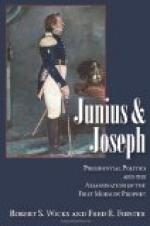“Sister Susannah,” said Smith humbly, “it’s my fault that you’ve become the brainy woman that you are, for I encouraged you at book learning (knowing as how when you found your heart ’twould shine with the more lustre), but if you were to go and live along side of a man as is a bookworm you’d lose your chance of this life (let alone your soul’s salvation by the apostasy which you think lightly of now). Anyhow I’d wait if I was you till his mother asks you, for she’d be in an awful taking if you and he were talk, talk, talking of what she didn’t understand. And he is her only son, and she is a widow.”
With this last phrase, which had a good and Scriptural sound, Smith had done.
Susannah gave him her hand in farewell, and listened gently while again he told her, as on the night of his flight from Kirtland, that his friendship and the friendship of his Church were always at her service.
The prophet walked down the street. A crowd of the Saints and a group of elders were waiting for him with impatience. Darling eyed his coming with looks gloomy and furtive, but the prophet was no longer, as on the previous night, wrathful and pompous. He spoke aside to Darling.
“I thought it right to tell our sister Susannah Halsey that her Gentile home had suffered bereavement. The uncle who has been as a father unto her is dead. I have been greatly exercised in grief for her,” continued Smith, briefly and truly; and then he added, also with truth, but with subtle suggestion, “I cannot think that further dealing with that household could be of advantage to her, but having laid the matter before the Lord, I was made aware that we must seek the good of all our sisters not with regard to outward appearance or inclination of the eyes; therefore, Brother Darling, let your motive be lowly, not having respect unto persons,” and he added with the simplicity of a child, “as mine is.”
Susannah was left with the bad picture in her mind which Smith had sketched there. She saw herself cold to her husband, lacking in passionate motherliness to his child, eager for the society of another man not out of love but intellectual vanity, and cavilling also at all religion because faith had no good soil to rest in. She sat long on the window-sill of the empty room, looking at an uncultivated patch of ground that even in May had no beauty save for here and there the stirring of a weed in the damp scented earth. She was stunned to see her life limned in such lines, and the truth in the drawing made it at first seem wholly true.
But Fate had another messenger that morning more potent than the prophet. A girl came by on the road, stopped, looked at her window, and by some impulse such as moved the buds and birds, tripped nearer in the sunshine and offered a flower. It was a sprig of quince blossom, and the girl stood laughing on the threshold of life just as Susannah had stood when Ephraim first showed her the flower of the quince. The false lines in the picture drawn by Smith faded at the touch of the pink winged flowers. Her heart sprang into the truth.




